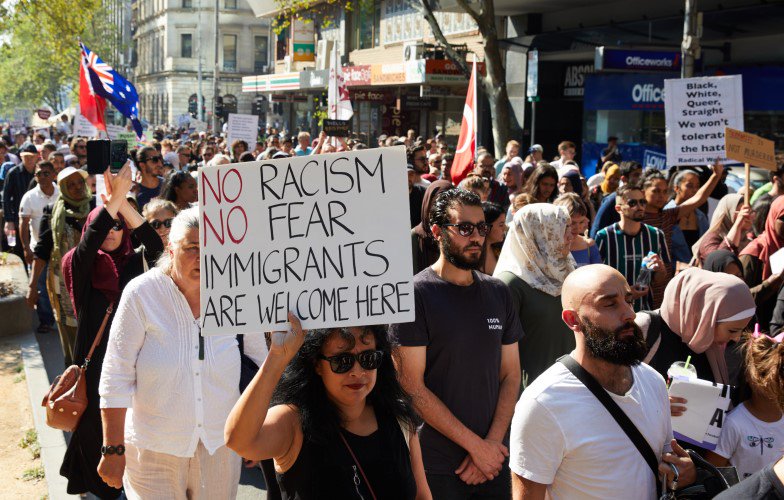IMAGE CREDIT: AAP/ERIK ANDERSON
Today’s Harmony Day, is taking place under the shadow of the heart breaking terrorist attack that occurred in New Zealand last Friday. While much soul-searching and analysis has occurred in the public space, I also reflected on what this day means in a corporate context and how my clients and colleagues will be responding. Typically, it is the day where we celebrate our diversity, wearing orange ribbons, eating interesting food, and appreciating the diversity of cultural experiences that successive waves of migrants have brought to our country.
But this year, I questioned both the importance of it and its meaning to me. I also wondered whether many people know the origin of Harmony Day. Worldwide it is The International Day for the Elimination of Racial Discrimination. Yet here in Australia, we choose not to reflect on racism but to celebrate our harmony.
Is the celebration of harmony alone sufficient? It seems insufficient when major newspapers and politicians in the recent past, demonise migrants, asylum seekers and refugees; when we don’t address our reconciliation action plans for Indigenous First People’s; when innocent people are killed in a place of worship for their Muslim background. Unity and harmony might help us heal but we can’t ignore the work that must be done to address racial profiling, bias and discrimination.
Which brings me to my thoughts on Harmony Day. The way we celebrate it, to me , is a relic of the past. The idea of celebrating the diversity of cultures, has its place. Certainly, relevant over the last two decades , when new migrants were trying to integrate, to show and share customs and traditions, that if you embrace and understand, you might actually like. In our work, we hear leaders say, “I love Indian/Asian food”, “We always celebrate Chinese New Year and Diwali in the office and we get dressed up too”.
This understanding and appreciation is not enough to ‘eliminate racial discrimination’ as the UN proclaimed 53 years ago when they marked the 21st of March in their calendar.
In fact in isolation, this celebration approach is potentially harmful. It lulls people into believing that they are doing something for diversity. It exoticises people from other nationalities by romanticizing and reinforcing a particular view of other cultures without doing anything to address actual concerns like racism or discrimination in the workplace (which if you think it does not exist, look at all the leadership around you in government, business and our media and ask do they represent the diversity of my community?)
You may wonder, what can you do? We advocate for the business community to reset their mindset and act in incremental, deliberate ways to make change.
- Firstly, acknowledge that race hate crimes do not come out of nowhere, nor are they just the act of one random psychopath but are views threaded through our society. The so called far-right “fringe elements” occupy the same space as the rest of us. To dismiss it as a random act, again means we are not acknowledging that a real problem exists.
- Secondly, commit to making a change and have a zero tolerance for discriminatory speech and attitudes and actions especially on a micro level – the jokes, the stereotyping, the comments. It is a tendency for all of us, to ignore rather than seem impolite or offend anyone by making a stand. That’s how these attitudes get tolerated and entrenched under the guise of ‘freedom of speech’. It is bizarre that people get more offended if you confront their actions and behaviours than the offensive nature of their comments. Yet, we cannot allow this to stand, if we are genuine about seeing change.
- Thirdly, recognise the skills and capabilities that all your staff possess and not only those who are similar to you. Diversity of thought comes from listening and promoting diverse people. Ingrained prejudices start to disappear when seeing diverse groups at all levels, (especially leadership levels) become the norm. It can be done, we have seen the change albeit slow over generations. Who in the business community today still, believes in the 1950’s attitudes to women or the marginalisation of Italian or Greek immigrants? If we don’t progress change, for all diverse people (especially our First people) we slow our economic growth and innovation for everyone.
While this is not all you can do by any stretch of the imagination, it is a start in the right direction.
As an ex-South African, I have seen and lived through, what segregation and a lack of inclusion can do to a country and its people. On ‘Harmony Day’ let us not forget that it is The International Day of the Elimination of Racial Discrimination, proclaimed in 1966 after a horrific day in South Africa’s history – the 21st of March 1960 when 69 peaceful protestors were shot and killed by police for opposing apartheid and ‘pass laws’. Now 59 years later almost to the day, we have another atrocity committed against another marginalised group. All of us need to consider what small changes we can make to normalise inclusion and diversity so that no groups are marginalised nor become future targets of hate.

Vick Pillay is the MD of MindTribes and had the original idea for CDWomen. Under his leadership, both brands have had award winning success, being recognised as one of Westpac’s Businesses of Tomorrow, 2018 and Telstra Business Award Finalists, 2016. His focus is on business operations, growth pathways and financial strategy. He brings this expertise and his global leadership experience having worked across Europe, America, Africa, Asia and Australia. He also a Plan International Ambassador, on the Board of the Australian Philippine Business Council and advisor to the Breast Cancer Network, Australia.
